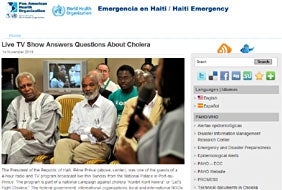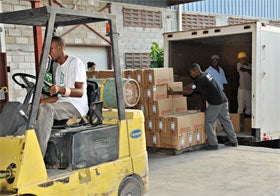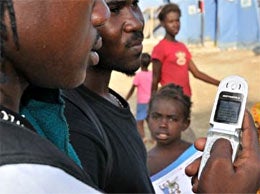
 To understand the magnitude of the efforts to control cholera in Haiti, one just has to glance at a special blog created by the Pan American Health Organization (PAHO) to document the emergency. It reflects interesting aspects of the work being carried on in that country.
To understand the magnitude of the efforts to control cholera in Haiti, one just has to glance at a special blog created by the Pan American Health Organization (PAHO) to document the emergency. It reflects interesting aspects of the work being carried on in that country.
Haiti, 15 November 2010 (PAHO) — To understand the magnitude of the efforts to control cholera in Haiti, one just has to glance at a special blog created by the Pan American Health Organization (PAHO) to document the emergency.
 The current cholera outbreak brought yet another challenge to a country that is still trying to rebuild its economy, infrastructure and institutions after the devastating January earthquake.
The current cholera outbreak brought yet another challenge to a country that is still trying to rebuild its economy, infrastructure and institutions after the devastating January earthquake.
It also brought an outpouring of support from all parts of the world, and put in evidence the dedication of the professionals and volunteers behind the efforts destined to improve health and well being in Haiti.
The Pan American Health Organization/World Health Organization, as the institution charged with the coordination of all the work in the area of Health, is at the center of an effort that encompasses and transcends epidemiology, medicine, policy-making, risk communication and health promotion.
Interesting aspects of the work carried on by PAHO/WHO in collaboration with the government of Haiti and international organizations such as UNICEF, MSF and many others, including non-governmental organizations, are reflected daily in the special Haiti blog.
 Reading the different posts one has a privileged, behind the scenes view of the work being carried out. In text, photos and video, the blog shows how countries near and far, such as Brazil, Spain and Japan, are donating medicines and supplies and sending professionals to work in the field.
Reading the different posts one has a privileged, behind the scenes view of the work being carried out. In text, photos and video, the blog shows how countries near and far, such as Brazil, Spain and Japan, are donating medicines and supplies and sending professionals to work in the field.
The immense work of PROMESS, the warehouse of essential medicines and supplies managed by PAHO/WHO in Port-au-Prince is documented in photos and video. It is comforting to know that not even the passage of Hurricane Tomas was enough to stop the work of PROMESS' staff and volunteers to ensure that the regions affected by the cholera outbreak have all they need to treat the epidemic.
The establishment and operation of CTCs, centers for the treatment of cholera in many parts of the country is also reflected in blog posts, as well as the dedication of local and international NGOs such as Haiti Participative and the International Organization for Migration (IOM). IOM's leaflets and radio programs are taking essential information about cholera prevention and control directly to people living in precarious conditions since the earthquake, in a language easy for them to understand and follow.
Haiti's ministries of Public Health, Culture and Communication and others are making the most of PAHO/WHO's support, creating and disseminating informational materials such as posters and leaflets, and keeping the press and the population informed through press conferences and a special telephone central for anyone with questions about cholera.
 The National Public Health Laboratory, which has been working tirelessly to process hundreds of thousands of cholera tests, is another government institution highlighted by the blog
The National Public Health Laboratory, which has been working tirelessly to process hundreds of thousands of cholera tests, is another government institution highlighted by the blog
The special Haiti blog—itself an example of the new ways of disseminating important public information—shows how other innovative approaches, such as sending text messages with cholera information to cell phones, are all part of an effort that is as ingenious as it is daunting.
For more information please contact Paulo Leite, Knowledge Management and Communication Area, tel (202) 974-3035, fax (202) 974-3143.



